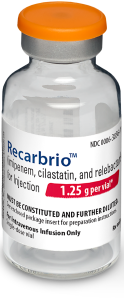Preparation, storage, and handling for RECARBRIO™ (imipenem, cilastatin, and relebactam)
RECARBRIO™ (imipenem, cilastatin, and relebactam) is supplied as a dry powder in a single-dose vial that must be constituted and further diluted using aseptic technique prior to intravenous infusion.
Preparation of RECARBRIO solution for intravenous administration
To prepare the infusion solution, contents of the vial must be constituted with the appropriate diluent as instructed below.

List of appropriate diluents:
- 0.9% Sodium Chloride Injection, USP
- 5% Dextrose Injection, USP
- 5% Dextrose Injection, USP + 0.9% Sodium Chloride Injection, USP
- 5% Dextrose Injection, USP + 0.45% Sodium Chloride Injection, USP
- 5% Dextrose Injection, USP + 0.225% Sodium Chloride Injection, USP
RECARBRIO has low aqueous solubility. To ensure complete dissolution it is important to adhere to the following instructions, irrespective of the intended patient’s renal function:

Option 1:
For diluents in prefilled 100-mL IV bags, proceed to step 2.
Option 2:
For diluents not in prefilled 100-mL IV bags:
- Aseptically withdraw 100 mL of diluent
- Transfer diluent to empty IV bag

Withdraw 20 mL (as two 10 mL aliquots) of diluent from IV bag
Constitute vial with one 10 mL aliquot of diluent
- The constituted suspension is for intravenous infusion only after dilution in an appropriate infusion solution

Shake vial well after constitution
Transfer suspension into remaining 80 mL of IV bag

Add second 10 mL aliquot of diluent to vial
Shake well
Repeat transfer of suspension to infusion solution
Agitate the resulting mixture in the bag until clear
Preparation of RECARBRIO solution for intravenous administration in patients with renal impairment
For patients with renal impairment, prepare a reduced dose of RECARBRIO (1 g, 0.75 g, or 0.5 g) by preparing a 100 mL solution containing 1.25 g, then withdrawing and discarding the excess as shown below.
Preparation of reduced RECARBRIO doses for intravenous administration in patients with renal impairment
Parenteral drug products should be inspected visually for particulate matter and discoloration prior to administration whenever solution and container permit. Discard if discoloration or visible particles are observed. Constituted solutions of RECARBRIO range from colorless to yellow. Variations of color within this range do not affect the potency of the product.
Storage of constituted solution
RECARBRIO, as supplied in single-dose glass vials upon constitution with the appropriate diluent and following further dilution in the infusion bag, maintains satisfactory potency for at least 2 hours at room temperature (up to 30 °C) or for at least 24 hours under refrigeration at 2 °C to 8 °C (36 °F to 46 °F). Do not freeze solutions of RECARBRIO.
Compatible drug products
The physical compatibility of RECARBRIO with selected injectable drug products was evaluated in 2 commonly available diluents. Compatible drugs with the corresponding compatible diluent (ie, 5% Dextrose Injection, USP or 0.9% Sodium Chloride Injection, USP) are listed below.
RECARBRIO should not be co-administered through the same IV line (or cannula), with other drug products not listed below, as no compatibility data are available. Refer to the respective prescribing information of the co-administered drug(s) to confirm compatibility of simultaneous co-administration.
List of Compatible Injectable Drugs for use with 5% Dextrose USP or 0.9% Sodium Chloride USP Injection as Diluents
- dexmedetomidine
- dopamine
- epinephrine
- fentanyl
- heparin
- midazolam
- norepinephrine
- phenylephrine
Incompatible injectable drug products
RECARBRIO for injection for intravenous infusion is physically incompatible with propofol in 5% Dextrose, USP or 0.9% Sodium Chloride, USP.
How RECARBRIO is supplied
RECARBRIO™ (imipenem, cilastatin, and relebactam) for injection, 1.25 grams is supplied as a white to light yellow sterile powder for constitution in a single-dose glass vial containing imipenem 500 mg (equivalent to 530 mg imipenem monohydrate), cilastatin 500 mg (equivalent to 531 mg cilastatin sodium), and relebactam 250 mg (equivalent to 263 mg relebactam monohydrate).
Storage and handling of vials
Store RECARBRIO vials at 20 °C to 25 °C (68 °F to 77 °F), excursions permitted between 15 °C to 30 °C (between 59 °F to 86 °F). Keep vials in the carton.
